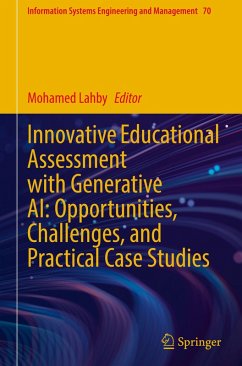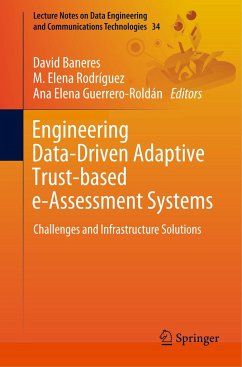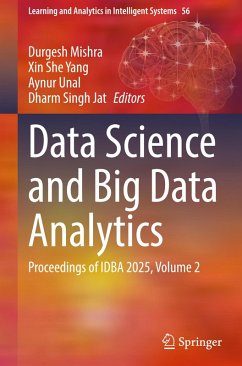
Emerging Challenges in Intelligent Management Information Systems
Proceedings of 28th European Conference on Artificial Intelligence ECAI 2025 - IMIS Workshop, Volume 2
Herausgegeben: Hernes, Marcin; Walaszczyk, Ewa; Rot, Artur

PAYBACK Punkte
76 °P sammeln!
This book contains the second volume of proceedings of the ECAI 2025 Workshop on Intelligent Management Information Systems (IMIS 2025). IMIS 2025 was part of the 28th European Conference on Artificial Intelligence ECAI 2025, held in Bologna, Italy from October 25, 2025, to October 30, 2025.The book discusses emerging challenges related to implementing artificial intelligence (AI) in Management Information Systems (IMIS). It explores the application of artificial intelligence AI across various business, technology, and science domains and underlines AI's primary and fundamental role in revolut...
This book contains the second volume of proceedings of the ECAI 2025 Workshop on Intelligent Management Information Systems (IMIS 2025). IMIS 2025 was part of the 28th European Conference on Artificial Intelligence ECAI 2025, held in Bologna, Italy from October 25, 2025, to October 30, 2025.
The book discusses emerging challenges related to implementing artificial intelligence (AI) in Management Information Systems (IMIS). It explores the application of artificial intelligence AI across various business, technology, and science domains and underlines AI's primary and fundamental role in revolutionizing management information systems by providing intelligent solutions to complex problems.
The main focus is put on application of AI supply chains, financial risk management, and anomaly detection in networks. It also discusses the use of AI in banking, data management, e-commerce, education, and sustainability, focusing on improving process efficiency and supporting decision-making in dynamic business environments. It highlights implementation challenges such as costs, integration with existing systems, and skill gaps, as well as the importance of human-computer interfaces and intelligent information management.
The volume is divided into four major parts covering the main issues related to the topic.
The first part presents application of AI concepts, methods and tools for supporting business processes. The second part focuses on developing intelligent methods for advanced decision support systems. The third part delves into research related to soft AI approaches, methods and tools for improving Management Information Systems. The fourth part addresses the research related to human problems in the broader process of interaction with the IMIS.
The book has an interdisciplinary character; therefore, it is intended for a broad scope of readers, including researchers, students, managers and employees of business organizations, software developers, IT and management specialists.
The book discusses emerging challenges related to implementing artificial intelligence (AI) in Management Information Systems (IMIS). It explores the application of artificial intelligence AI across various business, technology, and science domains and underlines AI's primary and fundamental role in revolutionizing management information systems by providing intelligent solutions to complex problems.
The main focus is put on application of AI supply chains, financial risk management, and anomaly detection in networks. It also discusses the use of AI in banking, data management, e-commerce, education, and sustainability, focusing on improving process efficiency and supporting decision-making in dynamic business environments. It highlights implementation challenges such as costs, integration with existing systems, and skill gaps, as well as the importance of human-computer interfaces and intelligent information management.
The volume is divided into four major parts covering the main issues related to the topic.
The first part presents application of AI concepts, methods and tools for supporting business processes. The second part focuses on developing intelligent methods for advanced decision support systems. The third part delves into research related to soft AI approaches, methods and tools for improving Management Information Systems. The fourth part addresses the research related to human problems in the broader process of interaction with the IMIS.
The book has an interdisciplinary character; therefore, it is intended for a broad scope of readers, including researchers, students, managers and employees of business organizations, software developers, IT and management specialists.












